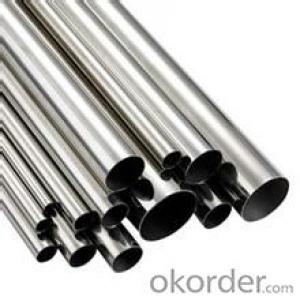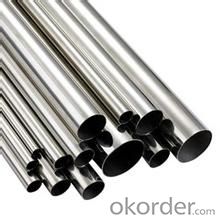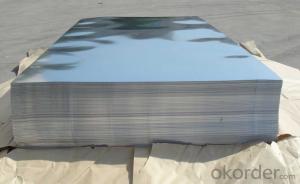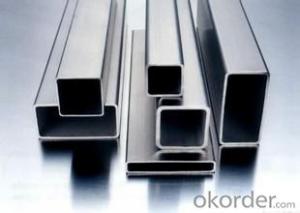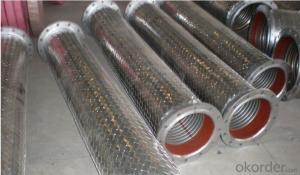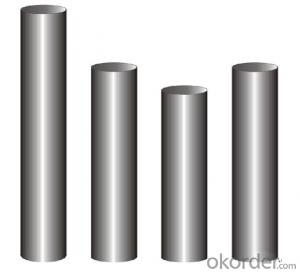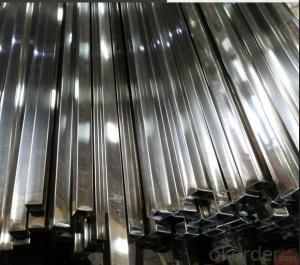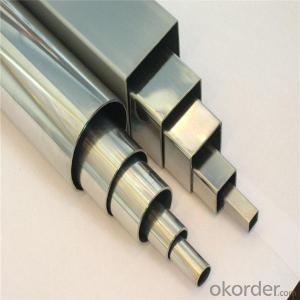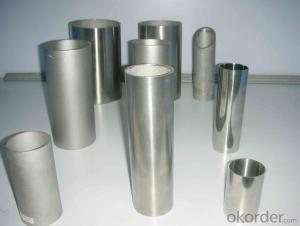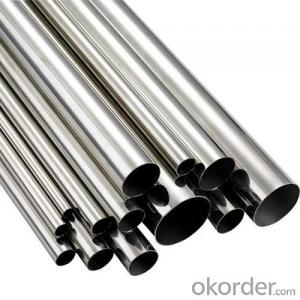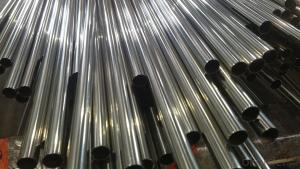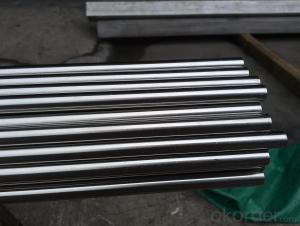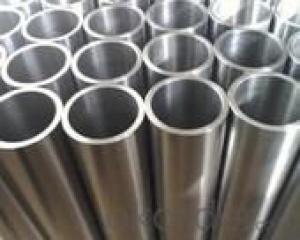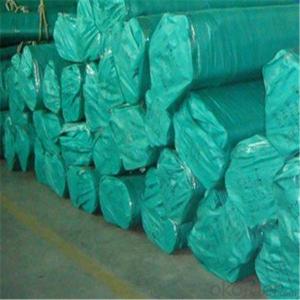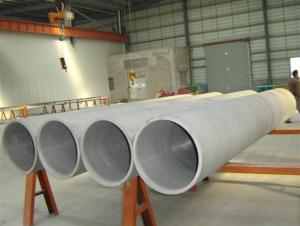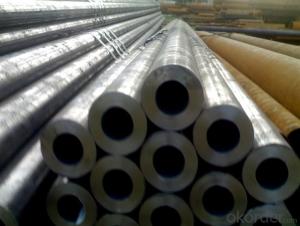316L corrosion resistant austenitic stainless steel pipe
- Loading Port:
- China main port
- Payment Terms:
- TT OR LC
- Min Order Qty:
- 20 m.t.
- Supply Capability:
- 5000 m.t./month
OKorder Service Pledge
OKorder Financial Service
You Might Also Like
AISI 316l stainless steel round pipe/tube
Product name: AISI stainless steel pipe/tube
Materials: 304, 304L, 310S, 316, 316L, 325, 273, 219 and 168
Thickness: 1, 2, 2.5, 3, 3.5, 4, 5, 6 and 8mm
Outer diameter: 6-480mm
Length: as required
Treatment: cold and hot rolled
Applications: construction upholstery, and industry instruments, such as fencing, railing,safe doors/windows, gate fittings, inside staircases, balcony balustrades, furniture, sanitary wares and kitchen wares
Standards: GB, AISI, ASTM, DIN and JIS
Sureface: 2B, BA and designer finishes
Price terms: FOB, CIF, CFR and EXW
Delivery:10-15 days after received the deposit or as quantity request.
Chemical Composition | C | Mn | P | S |
<=0.0< span="">3 | <=2.00< span=""> | <=0.0< span="">35 | <=0.03< span=""> | |
Si | Cr | N | Ni | |
<=1.00< span=""> | 16-18 | NO | 12-15 |
- Q: Can stainless steel pipes be used for wastewater applications?
- Yes, stainless steel pipes can be used for wastewater applications. Stainless steel is highly resistant to corrosion and can withstand the harsh chemicals and contaminants present in wastewater. It is also durable and has a long lifespan, making it a reliable choice for wastewater systems.
- Q: How do stainless steel pipes compare to titanium pipes?
- Stainless steel pipes and titanium pipes exhibit distinct characteristics, catering to diverse applications based on specific needs. In terms of strength, titanium pipes generally outperform stainless steel pipes. Titanium possesses an impressive strength-to-weight ratio, making it an ideal choice for lightweight yet strong materials. Conversely, stainless steel is renowned for its excellent tensile strength and durability, albeit being relatively heavier than titanium. Regarding corrosion resistance, both stainless steel and titanium pipes demonstrate high resistance to corrosion. Nevertheless, titanium pipes offer superior corrosion resistance, particularly in aggressive environments like seawater or chemical processing applications. Stainless steel pipes also possess good corrosion resistance but might require additional coatings or treatments to enhance their resistance in certain conditions. Temperature resistance is another crucial aspect to consider. Titanium pipes can endure high temperatures without compromising their strength or structural integrity, making them suitable for high-temperature applications in industries such as aerospace or power generation. Stainless steel pipes also exhibit decent heat resistance, but their performance may vary depending on the specific grade of stainless steel and the temperature range involved. Cost is an essential factor as well. Generally, stainless steel pipes are more cost-effective compared to titanium pipes. Titanium, due to its scarcity, intricate fabrication process, and higher production costs, is a pricier material. Hence, if cost is a significant consideration, stainless steel pipes emerge as a more viable option. In conclusion, stainless steel pipes and titanium pipes possess their own merits and aptitude for distinct applications. Titanium pipes excel in terms of strength, corrosion resistance, and heat resistance but come at a higher cost. Stainless steel pipes offer satisfactory strength, corrosion resistance, and cost-effectiveness. Ultimately, the selection between the two relies on the specific requirements, budget, and intended application of the pipes.
- Q: Can stainless steel pipes be pickled?
- Indeed, it is possible to pickle stainless steel pipes. Pickling serves as a method employed in order to eliminate impurities, including scale, rust, and various surface contaminants, from the exterior of stainless steel. This procedure entails submerging the stainless steel pipes in a pickling solution, which typically consists of a combination of nitric and hydrofluoric acid. As a result of the pickling solution's action, the impurities are dissolved, leaving behind a pristine and sleek surface on the stainless steel pipes. Pickling is widely utilized in industries such as oil and gas, food processing, and chemical processing to prepare stainless steel pipes for subsequent procedures or to enhance their resistance to corrosion.
- Q: Are stainless steel pipes suitable for heat exchangers?
- Stainless steel pipes are appropriate for heat exchangers. Stainless steel possesses remarkable heat resistance properties, making it an optimal choice for applications involving elevated temperatures. It is capable of enduring extreme heat without distorting or compromising its structural integrity. Moreover, stainless steel exhibits a high level of resistance against corrosion, which is vital for heat exchangers as they often come into contact with corrosive fluids or environments. This corrosion resistance guarantees the longevity and dependability of the heat exchanger, minimizing the possibility of leaks or malfunctions. Stainless steel pipes also boast exceptional thermal conductivity, facilitating efficient heat transfer between the fluids within the exchanger. All in all, the durability, corrosion resistance, and ability to withstand high temperatures make stainless steel pipes widely employed in heat exchangers.
- Q: Are stainless steel pipes suitable for food storage facilities?
- Stainless steel pipes are a perfect fit for food storage facilities. The food industry widely embraces stainless steel due to its many advantageous properties. Firstly, stainless steel's resistance to corrosion is crucial in food storage facilities where exposure to moisture and various food products is common. This resistance guarantees that the pipes will not rust or deteriorate over time, thus preventing any potential contamination of the stored food. Furthermore, stainless steel pipes are easy to clean and maintain, making them the ideal choice for food storage facilities that must comply with strict hygiene standards. The smooth and non-porous surface of these pipes prevents the buildup of bacteria, ensuring that the stored food remains safe and uncontaminated. Stainless steel is also a non-reactive material, meaning it does not release any harmful substances into the food. This is particularly important in food storage facilities, as it guarantees the preservation of the integrity and quality of the stored food products. Additionally, stainless steel pipes possess excellent strength and durability, enabling them to withstand the high pressures and temperature fluctuations commonly encountered in food storage facilities. This ensures that the pipes will not fail or break, providing a dependable and long-lasting solution. To conclude, stainless steel pipes are highly suitable for food storage facilities due to their resistance to corrosion, ease of cleaning, non-reactive nature, and strength. They create a safe and hygienic environment for storing food, thereby ensuring the preservation of the integrity and quality of the stored products.
- Q: Can stainless steel pipes be used in the food and beverage industry?
- Yes, stainless steel pipes can be used in the food and beverage industry. Stainless steel is a popular choice in this industry due to its corrosion resistance, hygienic properties, and ability to withstand high temperatures. It is commonly used for transporting various food and beverage products, ensuring safety and maintaining product integrity.
- Q: What is the difference between 410 and 416 stainless steel pipes?
- The main difference between 410 and 416 stainless steel pipes is their composition and properties. 410 stainless steel is a basic martensitic stainless steel with high strength and good corrosion resistance but limited in terms of heat resistance. On the other hand, 416 stainless steel is a free-machining martensitic stainless steel with added sulfur, which enhances its machinability but slightly reduces its corrosion resistance compared to 410 stainless steel. Therefore, 410 stainless steel pipes are better suited for applications requiring higher heat resistance, while 416 stainless steel pipes are preferred when better machinability is needed.
- Q: Stainless steel pipe drilling?
- Acid resistant stainless steel is stainless steel, the resistance of air, steam, water and other weak corrosive medium or with stainless steel known as stainless steel; while the resistance to chemical corrosion (acid, alkali and salt chemical etching) corrosion of steel called acid resistant steel. Because of the difference in the chemical composition of the two, and make their corrosion resistance is different, ordinary stainless steel is generally not resistant to chemical medium corrosion, and acid resistant steel are generally stainless steel.
- Q: Are stainless steel pipes resistant to chlorine corrosion?
- Yes, stainless steel pipes are highly resistant to chlorine corrosion.
- Q: What is the difference between nominal size and actual size in stainless steel pipes?
- The nominal size of a stainless steel pipe refers to the designated size used for identification purposes, while the actual size represents the true dimensions of the pipe. Nominal size is typically indicated by a number, such as 1/2 inch or 2 inches, but the actual size may differ slightly due to manufacturing tolerances.
Send your message to us
316L corrosion resistant austenitic stainless steel pipe
- Loading Port:
- China main port
- Payment Terms:
- TT OR LC
- Min Order Qty:
- 20 m.t.
- Supply Capability:
- 5000 m.t./month
OKorder Service Pledge
OKorder Financial Service
Similar products
Hot products
Hot Searches
Related keywords
